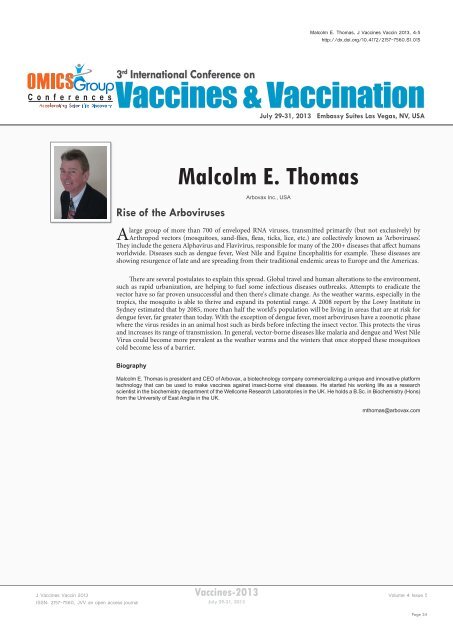Vaccines-2013 - OMICS Group
Vaccines-2013 - OMICS Group
Vaccines-2013 - OMICS Group
You also want an ePaper? Increase the reach of your titles
YUMPU automatically turns print PDFs into web optimized ePapers that Google loves.
Malcolm E. Thomas, J <strong>Vaccines</strong> Vaccin <strong>2013</strong>, 4:5http://dx.doi.org/10.4172/2157-7560.S1.0153 rd International Conference on<strong>Vaccines</strong> & VaccinationJuly 29-31, <strong>2013</strong> Embassy Suites Las Vegas, NV, USARise of the ArbovirusesMalcolm E. ThomasArbovax Inc., USAlarge group of more than 700 of enveloped RNA viruses, transmitted primarily (but not exclusively) byA Arthropod vectors (mosquitoes, sand-flies, fleas, ticks, lice, etc.) are collectively known as ‘Arboviruses’.They include the genera Alphavirus and Flavivirus, responsible for many of the 200+ diseases that affect humansworldwide. Diseases such as dengue fever, West Nile and Equine Encephalitis for example. These diseases areshowing resurgence of late and are spreading from their traditional endemic areas to Europe and the Americas.There are several postulates to explain this spread. Global travel and human alterations to the environment,such as rapid urbanization, are helping to fuel some infectious diseases outbreaks. Attempts to eradicate thevector have so far proven unsuccessful and then there's climate change. As the weather warms, especially in thetropics, the mosquito is able to thrive and expand its potential range. A 2008 report by the Lowy Institute inSydney estimated that by 2085, more than half the world's population will be living in areas that are at risk fordengue fever, far greater than today. With the exception of dengue fever, most arboviruses have a zoonotic phasewhere the virus resides in an animal host such as birds before infecting the insect vector. This protects the virusand increases its range of transmission. In general, vector-borne diseases like malaria and dengue and West NileVirus could become more prevalent as the weather warms and the winters that once stopped these mosquitoescold become less of a barrier.BiographyMalcolm E. Thomas is president and CEO of Arbovax, a biotechnology company commercializing a unique and innovative platformtechnology that can be used to make vaccines against insect-borne viral diseases. He started his working life as a researchscientist in the biochemistry department of the Wellcome Research Laboratories in the UK. He holds a B.Sc. in Biochemistry (Hons)from the University of East Anglia in the UK.mthomas@arbovax.comJ <strong>Vaccines</strong> Vaccin <strong>2013</strong>ISSN: 2157-7560, JVV an open access journal<strong>Vaccines</strong>-<strong>2013</strong>July 29-31, <strong>2013</strong>Volume 4 Issue 5Page 34


